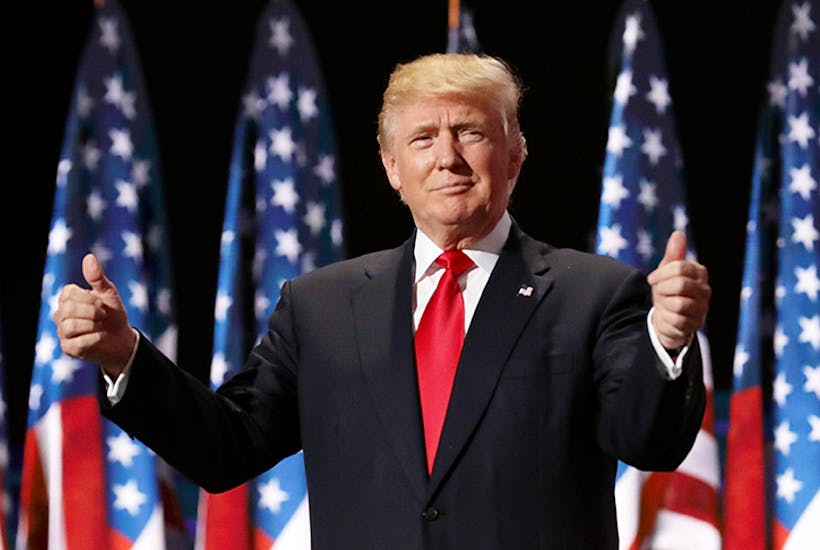Leaders are often accused of escalating a conflict abroad in order to distract from headaches at home. On Tuesday, before Iran’s missiles were fired, Donald Trump seemed to be doing the opposite. He and his media surrogates started their now all-too-familiar yabbering about impeachment and the Democrats. It felt as if they were trying to move the news cycle away from the Iran crisis. We’re in an election year after all, and the polls suggest a large majority of American voters don’t want more war.
Then Tehran launched what it is calling ‘Operation Martyr Soleimani’, which at first prompted a rare nervous silence in Washington. The White House led reporters to believe the President would gravely address the nation that night, but he postponed. Then, suddenly, it was good news: no reported American casualties. Twitter Trump went into positive mode: ‘So far, so good!’
Talking heads started pronouncing that the Iranians had given Trump an ‘off ramp’ — these were honour missiles, apparently, vengeance without blood to save beardy face. The Iranians had to be seen to avenge America’s assassination of Qassem Soleimani. They aren’t crazy enough to invite their own obliteration. It seems desperate, however, to suggest, just hours after Iran launched a cross-border strike on American targets in Iraq, that everything is calming down. You don’t necessarily have to be a conspiracy theorist to think it’s a bit suspicious that, early on Wednesday, a Ukrainian passenger plane crashed outside Tehran, killing 176 passengers.
Maybe Trump, a lucky general, will get away with it again. His administration can go back to talking about ‘de-escalation’ as if it were all part of some brilliant plan. ‘We are not looking to start a war,’ says Defence Secretary Mark Esper. ‘We are looking to finish one.’ That sounds clear and tough — until you start to think about it. For all its murderous mischief, Tehran has not been at war with America. To say otherwise is hot air. Besides, since when does America finish wars? The Iraq adventure has been bubbling away disastrously for 17 years; the hopeless Afghanistan effort has taken nearly two decades.
Ah, say the Trump fans in Washington, but this President is different. His boldness opens new possibilities. Secretary of State Mike Pompeo said this week that, whereas Barack Obama tried to ‘underwrite and appease’, Trump has been willing to ‘confront and contain’. Except he hasn’t. In June, at the very last moment, Trump cancelled a punitive strike on Iran for having targeted Saudi oil facilities.
Is it all madman-theory brinksmanship? As he did with Kim Jong-un, Trump tries to con his enemy into thinking he is insanely unpredictable. But one wonders if Trump himself isn’t sometimes fooled by his own trick. I’m told he has privately exhibited a distinct nervousness in recent days.
Or perhaps he really is inventing some inspired form of improvisational statecraft? His critics say that he is incapable of serious strategic thought. But what Trump beautifully exposes is that everyone is winging everything all the time. It’s not as if academic grand theory has done America any good in recent decades. In an endlessly complex world, Trump’s gut instincts are arguably better than any game-planned containment stratagem.
If Team Trump really are pretending to make it up as they go along, it’s one of the all-time great acts. Soleimani, they say, represented an ‘imminent threat’. Everyone thinks that’s flam: we’ve been told for years that Soleimani has been killing Americans. Trump officials allude to ‘exquisite intelligence’, which showed something very bad was about to happen. That might be more believable if the Trump administration hadn’t spent years convincing the public that its intelligence agencies lie.
The truth probably is that Trump acted impulsively, then realised that to be re-elected, he may need to beat a hasty retreat without looking like he’s backing down. Who, then, is saving face?
Freddy Gray is deputy editor of The Spectator and editor of Spectator USA.







Comments